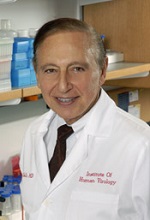Working at the direction of esteemed HIV researcher Dr. Robert Gallo, a University of Maryland team is taking its HIV vaccine candidate to human trials. In doing so, it's joining a race that has seen no shortage of attention of late as organizations near and far have worked to battle the virus' challenging characteristics.
 |
| Dr. Robert Gallo |
On Oct. 1, the University of Maryland School of Medicine's Institute of Human Virology began enrolling volunteers for its Phase I study to test the ability of its vaccine, dubbed the Full Length Single Chain, to create a broad antibody response to numerous HIV strains. The candidate is being developed by a team under the direction of Gallo, who serves as director of the institute and who has spent much of his professional life dedicated to HIV research.
While the candidate remains in early stages, Gallo and his team hope their shot can make progress against one of the largest unsolved problems in medicine. But they're not alone, with teams from The Scripps Research Institute, Johnson & Johnson ($JNJ), Harvard and others prepping human studies to test their own HIV vax candidates.
Past HIV vaccine development work has been hindered by candidates' inability to target all strains of the virus, the Baltimore Business Journal reported, so the efforts now are to focus on creating a broad response, a feature said to be part of the Full Length Single Chain vaccine.
That feature is also being sought by scientists from the Scripps Research Institute, who found in June that their candidate developed broadly neutralizing antibodies in a mouse study. Since then, a separate team from the Scripps campus in Florida received a $6 million grant from the Bill & Melinda Gates Foundation to work on its candidate, which professor Michael Farzan described as the "broadest and most potent entry inhibitor described so far, effective against all strains tested."
On the Big Pharma side of the field, Johnson & Johnson reported promising results of its candidate in monkeys back in July and discussed plans to start a Phase I/IIa trial. Meanwhile, France-based Biosantech reported over the summer that its HIV vaccine candidate was not toxic in a study involving 48 HIV-positive patients. Just before that, Duke University scored a $20 million National Institutes of Health grant to develop its own vaccine.
- here's the announcement